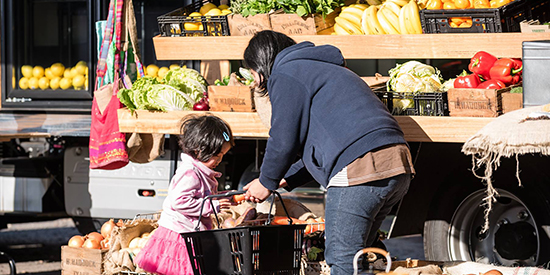Study aims to address food security for asylum seekers
Media releaseMost Australians probably couldn't imagine having just $10 a week for food, but this is the reality facing many people seeking asylum in Australia – and a new Deakin University research project aims to do something about it.
Dr Fiona McKay, from Deakin's School of Health and Social Development, said research showed one in two people seeking asylum in Melbourne went hungry, and more needed to be done to understand how best to support the most vulnerable people in this community.
“Getting enough of the right, good quality food to people seeking asylum is critical for their health and wellbeing,” Dr McKay said.
But she said that many were trapped in a cycle of poverty that left them with as little as $10 to spend on fresh food per week.
“From a study that we did last year, we know that many people seeking asylum have trouble accessing enough food to eat, and even more trouble accessing culturally appropriate foods,” she said.
“We found that more than 90 per cent were experiencing food insecurity with around half also experiencing hunger – 18 per cent were eating just one meal per day.
“Much of this is compounded by money, more specifically a lack of it. While some may have access to a reduced welfare payment, around $220 per week, many are unable to access employment, and as a result live in poverty.”
Dr McKay's next steps are to find out how people seeking asylum are using food services provided by the Asylum Seeker Resource Centre to bridge this gap, particularly focussing on the centre’s Food Justice Truck, which travels around metropolitan Melbourne selling fresh food to the community at a 75 per cent discount.
The social enterprise also encourages other customers to use the food truck for their own grocery shopping, using the profits from full priced purchases to fund the discount for people seeking asylum.
In the 18 months the truck has been up and running, it has served thousands of customers, but Dr McKay said there was little understanding of the effectiveness of the program and whether it was helping the people who needed it most.
“At the moment, we don't know much about the people seeking asylum who are using the truck. We don’t know where they're from, how long they've been in Australia, or if they have a job,” she said.
“We don't know how many people are being fed by the food bought at the truck each week, the other places shoppers are getting their food from, if the Food Justice Truck is meeting all of their needs, nor do we know if anything important is missing from the stock.”
Dr McKay said her project would seek to answer some of these questions.
It has been chosen as part of the latest Research My World campaign, a partnership between Deakin and Pozible.com that uses crowdfunding to promote research with a strong community connection.
Dr McKay aims to reach her funding target of $5000 by 7 December 2016 and get started on the research early next year.
“Once we better understand the needs of those using the Food Justice Truck, we will be able to better cater for them, make sure we have enough of the right foods, and continue to work toward food security for people seeking asylum,” she said.
Those wishing to support the food security for asylum seekers project can make a pledge at www.pozible.com/project/food-security-for-asylum-seekers.

